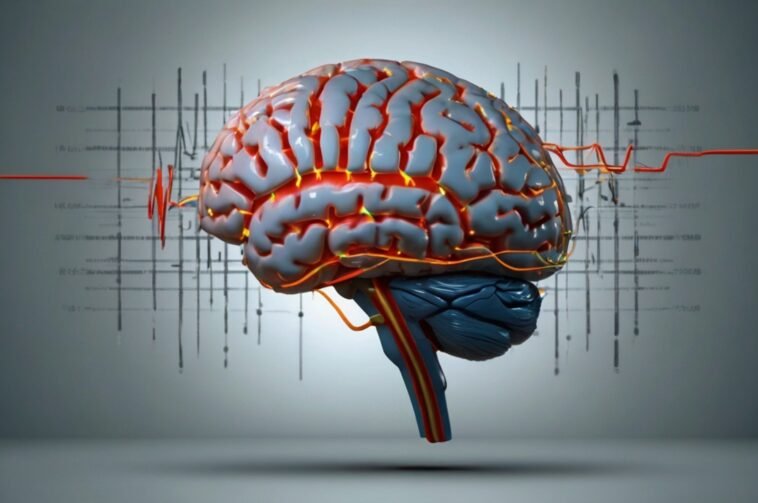
Imagine if we could unlock hidden mental or physical abilities just by tapping into our brain’s natural rhythms.
It sounds like something out of science fiction, but in reality, researchers are discovering that brain waves might hold the secret to boosting cognitive performance, improving mental health, and even enhancing physical abilities.
As brain wave research advances, more people are wondering: are brain waves the key to unlocking human potential?
In this article, we’ll explore what brain waves are, how they work, and how they might shape the future of personal development.
What are Brain Waves?
Brain waves are electrical impulses produced by the brain’s neurons.
When neurons communicate with each other, they generate electrical signals that produce oscillating patterns known as brain waves.
Measured in hertz (Hz), these brain waves fall into several distinct categories, each associated with different types of mental activity and states of consciousness.
There are five primary types of brain waves:
| Brain Wave Frequency | Range (Hz) |
Associated Mental States
|
| Gamma | 30 – 100 |
Heightened perception, problem-solving
|
| Beta | 14 – 30 |
Active thinking, alertness
|
| Alpha | 8 – 12 |
Relaxation, calmness
|
| Theta | 4 – 8 |
Deep meditation, creativity
|
| Delta | 0.5 – 4 |
Deep sleep, healing
|
These brain wave frequencies play a significant role in our everyday lives, affecting everything from learning and creativity to stress levels and sleep quality.
- Read also: Unraveling the Rhythms: Understanding ADHD Brain Waves
- Read also: Cognitive Benefits: Does Fasting Improve Brain Function?

How Do Brain Waves Work?
Brain waves aren’t static; they shift in response to our mental activities, emotions, and physical state.
This dynamic nature allows the brain to adapt to various tasks and environments.
For example, when we’re focused on solving a math problem, beta waves increase, indicating heightened alertness and cognitive engagement.
Conversely, during meditation, alpha and theta waves rise, promoting relaxation and creativity.
Research has shown that certain brain wave patterns can lead to more efficient processing, memory consolidation, and overall mental resilience.
Techniques like neurofeedback and transcranial magnetic stimulation (TMS) allow researchers and practitioners to observe and even influence brain waves in ways that may optimize our mental and physical capabilities.
Brain Waves and Human Potential
Harnessing the power of brain waves could potentially enhance cognitive performance, improve mental health, and optimize physical performance.
Let’s examine how brain waves might help us reach these goals.
Enhanced cognitive performance
Studies suggest that different brain wave states can enhance cognitive skills, including memory, focus, and creativity.
For instance, alpha waves are known to increase during creative tasks, and researchers have found that boosting alpha waves can lead to higher levels of creative thinking.
A 2018 study published in Nature Neuroscience found that increasing alpha wave activity helped participants improve creative problem-solving abilities.
Likewise, gamma waves, which are linked to information processing and memory, have been found to play a role in peak cognitive performance.
People with higher gamma wave activity often experience better memory recall and learning abilities.
Some researchers believe that by enhancing gamma waves through training, we may be able to improve our memory retention and overall cognitive flexibility.
Mental health and well-being
Brain waves are not only tied to cognitive tasks but also play a crucial role in mental health.
Research has shown that an imbalance in brain wave frequencies can contribute to conditions such as anxiety, depression, and insomnia.
For example, individuals with excessive beta wave activity may be more prone to anxiety and overthinking, while those with low alpha wave activity may struggle to relax.
Neurofeedback therapy, which helps regulate brain wave frequencies, has gained traction as a promising treatment for mental health issues.
A 2019 study published in Frontiers in Psychology demonstrated that neurofeedback could help reduce symptoms of anxiety and depression by rebalancing brain wave patterns.
By learning to control their brain waves, patients may achieve better mental stability, resilience, and emotional balance.
Physical health and performance
Brain waves also influence physical performance.
Athletes, for instance, can benefit from brain wave training that enhances focus, reaction time, and recovery.
Many professional athletes use brain wave optimization techniques to enter the “flow state,” a mental zone where they perform optimally without being distracted by external factors.
Moreover, delta waves, which dominate during deep sleep, play a critical role in the body’s healing and recovery process.
Athletes and high-performing individuals rely on this deep sleep phase to repair muscles, recover from physical strain, and prepare for the next day.
Poor delta wave activity can lead to disrupted sleep patterns, impacting physical recovery and overall health.

The Future of Brain Wave Technology
As our understanding of brain waves advances, we are beginning to see the development of brain wave technology that could help unlock human potential.
Some of the most promising tools include neurofeedback devices, brain-computer interfaces (BCIs), and wearable technology designed to monitor and optimize brain wave states.
Neurofeedback devices
Neurofeedback devices, available as clinical tools and consumer products, offer real-time feedback on brain activity, allowing users to “train” their brain waves.
Companies like Muse and NeuroSky provide wearable devices that monitor brain waves and guide users into desired mental states, such as relaxation or focus.
With practice, individuals can learn to shift their brain wave patterns, which can potentially enhance cognitive abilities, reduce stress, and improve sleep.
Brain-computer interfaces (BCIs)
BCIs take brain wave technology to the next level by directly linking the brain to external devices.
Though still in early stages, BCIs could one day allow users to control computers, prosthetics, or even robotic devices with their thoughts alone.
Researchers are exploring the potential for BCIs to help individuals with disabilities, allowing them to communicate or perform tasks they couldn’t do independently.
Wearable technology
Wearable tech for brain wave monitoring is becoming increasingly accessible.
These devices can measure stress levels, alertness, and sleep quality by analyzing brain wave patterns.
Such wearable tech may help individuals manage their health and wellness more proactively by offering insights into how they can adjust their brain wave activity for optimal well-being.

- Read also: Understanding Slow Brain Waves and Their Symptoms
- Read also: How to Change Brain Waves at Will: Altering Your Mental State
Final Thoughts
Are brain waves truly the key to unlocking human potential?
While there’s still much to learn, current research suggests that brain waves have a profound impact on our cognitive abilities, mental health, and physical performance.
With advancing technology and a growing understanding of brain wave functions, we may be on the cusp of a new era in personal development.
Whether through neurofeedback, BCIs, or wearables, tapping into the power of brain waves could open new possibilities for enhancing our lives and reaching our full potential.



